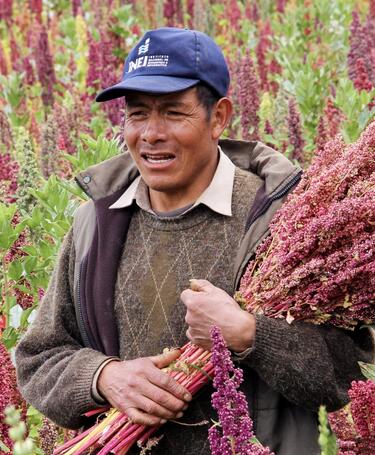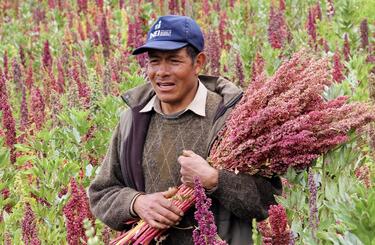
Raising and auditing ESG standards – from Lima to London

Find out how applying internationally recognised standards, such as B Corp, is supporting the development of a South American health food business.
Traditional Peruvian food farming methods require low chemical inputs and support rural communities. Therefore, when it comes to meeting environmental, social, sustainable and ethical standards, they should tick plenty of boxes.
However, in setting up their superfood business Villa Andina, in Peru, and planning its expansion into markets beyond South America, founders Daniel and Pedro Martinto made sure they could provide solid evidence to their customers and stakeholders that such standards were being achieved.
They did this by applying to be a B Corporation (B Corp), an international certification that guarantees a for-profit business meets required standards of social and environmental performance and integrates specific commitments into its governance.
Emphasis on ESG
There are more than 3,300 B Corp companies across 71 countries, which qualify by:
- Filing detailed information about the environmental, social and governance (ESG) status of their operations
- Meeting specific legal requirements
- Being subject to background checks and random on-site audits.
Around 10 per cent of B Corp companies are audited every year and, to retain their status, companies must apply for recertification every three years.
Having B Corp certification validates the ethics of Villa Andina’s activities. The business connects around 5,000 small, family farming businesses in rural Peru to international supply chains through three processing facilities, employing 280 people throughout the country.
Pedro Martinto, joint Managing Director, says: “We created a business model that involves working with the wide variety of biodiverse raw materials available in Peru. This contributes to improvement in living conditions in rural communities. It allows us to cooperate with all stakeholders involved in the value chain.”
The company gives hands-on guidance and financial assistance to its farmers to ensure that, when they arrive at the processing stage, every product meets the correct standards.
Having B Corp certification validates a range of Villa Andina’s activities
“We have a field team of 14 technical assistants who support our farmers,” says Pedro Martinto. “They provide them with free training in good organic farming practices; and help manage traceability with specialised GPS software and the logistics of getting their products from the field to the processing facilities.”
The company also provides the organic compost it creates, and other agricultural inputs, free of charge to growers, and covers the cost of all the certification they need.
Once the products arrive at Villa Andina's processing facilities, they are subject to AA grade processes certified by BRGCS .
The company’s main operation in Cajamarca, Peru's poorest region – processing organic dried fruits; superfoods like maca, camu camu, lucuma; and organic cacao derivatives – is entirely waste-free. This means all organic waste, such as fruits peal, bone and cacao husks, is converted into fertiliser using vermicompost, and given back to farmers to help increase yields and improve soil quality.
Another facility is located in the Peruvian jungle, where cacao is freeze-dried to transform pulp into a sweet powder that can be used as an ingredient by food manufacturers. The company’s other processing plant is based in Lima, specialising in Andean grains including quinoa, chia, amaranth and canihua, a higher protein cousin to quinoa.
Ethical audits
All three facilities are audited by Sedex Members Ethical Trade Audit (SMETA), which assesses a site based on standards of labour, health and safety, environment, and business ethics.
The B Corp and SMETA audits – in addition to FairTrade and UTZ certification – cover off most of the ‘ethical’ attributes increasingly sought by international customers.
Ahead of launching in the UK, where Villa Andina has now opened an office, the business also sought certification via the Global Food Safety Initiative (GFSI), which is independently audited and covers food safety, packaging, quality, storage and transport of products.
Modern benchmarking
Organic practices like crop rotation and soil conservation using terraces have been used for centuries in Peru, and Martinto says these benchmark well against modern standards such as those set by the Soil Association.
“Traditional farming practices in the Andean region overlap with organic farming practices that are promoted via Organic Europe and Soil Association standards,” he says. “We have a field programme that systemises these ancient traditional practices and covers all costs involved in certifying our members as organic. Organic certification gives a tangible value to their ancient farming practices and helps farmers set a price premium for them.”
The need for companies like Villa Andina to gain multiple certifications to prove their ESG credentials demonstrates how consumers across the world are becoming more and more demanding about the quality and ethical standards set by the organisations they buy from.
Quality assurance in the supply chain
Quality assurance is an essential part of any supply chain, and has become a top priority for both buyers and sellers in the food and beverage industry.